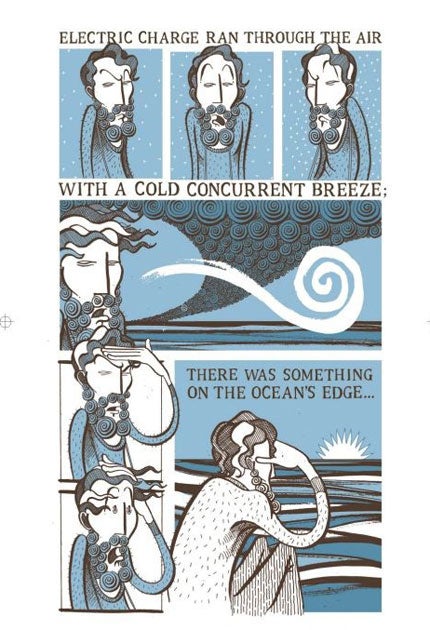Rime Of The Ancient Mariner: the eco-fable graphic novel
Coleridge's 'Rime Of The Ancient Mariner' – the original eco-fable - has been reimagined as a chic graphic novel. Its aim? To save the oceans

First published in 1798, Samuel Taylor Coleridge's masterpiece, The Rime of the Ancient Mariner, with its complex narrative and supernatural overtones, the account of sin and restoration, may at first seem an unlikely piece of literature to rework into a cautionary tale about how we treat our planet today, but Nick Hayes, an author and illustrator, has done just that.
The Rime of the Modern Mariner is a beautifully illustrated graphic novel that updates the familiar tale of Coleridge's poem, which sees a weary mariner forced to roam the earth telling all who will listen about the dastardly events that occur after he foolishly kills an albatross while out at sea. Hayes modernises Coleridge's wedding guest, whom the mariner confronts to tell his tale, into a divorced office-worker having lunch in a park (who, sure enough, thoughtlessly discards his plastic sandwich box on the floor during the tale).
The story this mariner relays is one of environmental doom. After killing the albatross and being forced to wear it around his neck, his ship hits the North Pacific gyre, home to a huge collection of plastic and chemical sludge, caused by man's excessive consumption. Hayes is graphic in his description: "Swathes of polystyrene/ Bobbed with tonnes of neoprene/ And polymethyl methacrylate/ Stretched across the scene/ Tupperware and bottletops/Bottled bleach and tyres/ The detritus of a careful kind/ a scattered funeral pyre." It is here that the mariner is picked up by the ghost ship – now a "North Pacific drilling barge" which has caused an oil slick. There are also tsunamis and ghostly apparitions to drive home the message that man must accept the consequences of his actions.
While Hayes certainly has an agenda, he is not a hardened environmental campaigner. In fact, his interest was sparked after surfing the net and stumbling across information about the North Pacific gyre. "There's this big patch of rubbish twice the size of Texas that is just crammed full of rubbish and it seemed completely weird and horrific. I found there were all manners of estimates as to the actual size of it. Some thought it was the size of France, others suggested it was twice that. I sort of imagined it as this big island that you could walk on, but it wasn't that at all; it is actually a column, nine kilometres tall from the bottom of the ocean that's just full of plastic. Apparently, if you chuck a plastic bottle in the Thames, within a year it will end up in there, where it will just float round and round."
Hayes, who had experience drawing political cartoons as well as being a member of the writing, illustration and comics periodical, Meat Magazine, was moved enough to focus on a novel about the situation, and what he saw as man's indifference to nature and the world around him.
It was after coming across an image of an albatross that he thought of using Coleridge's poem as the basis for his work. "I saw a picture on the internet of a half-rotting albatross," he says. "Its belly had exploded because it was eating plastic bottle-tops, thinking that they were shrimp. So it carried on eating them and, because plastic doesn't degrade, eventually the stomach got full and it tore open the bird's chest and, obviously, it died. Because of the poem, the image of the albatross heavily permeates our language, everyone knows the image of the albatross and it just made it seem like an obvious thing to do."
The albatross doesn't drop from the mariner's neck until he comes to an understanding and appreciation of the natural world. "He sees the massive scale of nature and the puny scale of man, and realises where we are in the hierarchy of things and feels less at the top of the scale. It's the moment where he falls in love with the slop of salp on the top of the plastic bottles, that's the moment the albatross drops because that's when he feels empathy for another creature."
While it's an enormous challenge, not to mention a brave move, to rework a classic, Hayes's entirely original verse and rich illustrations mean that it more than stands up as a work in its own right.
Unlike Coleridge's version, the office-worker doesn't listen to the mariner, taking him for a madman, and so our indifferent villain hurries back into "a world detached of consequence". We see him go down a nondescript high street, which includes a shop called Humankind – a sign hanging in its window that reads 'Closing Down Sale'. A stark tale for our time, indeed.
The Rime of the Modern Mariner by Nick Hayes is published by Jonathan Cape (£18.99). To order a copy for the special price of £15.99 (free P&P) call Independent Books Direct on 08430 600030, or visit www.independentbooksdirect.co.uk
Join our commenting forum
Join thought-provoking conversations, follow other Independent readers and see their replies
Comments